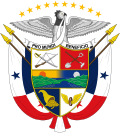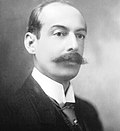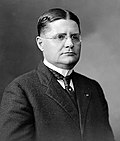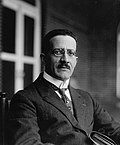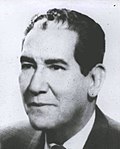No. Portrait President(Birth–Death) Elected Term of office Political Party Took office Left office Time in office 1 Manuel Amador Guerrero (1833–1909) 1904 20 February 1904 23 June 1907 [ 2] 3 years, 123 days PC 2 José Domingo de Obaldía (1845–1910) — 24 June 1907 [ 2] 27 December 1907 [ 2] 186 days PLN (1) Manuel Amador Guerrero (1833–1909) — 29 December 1907 [ 2] 1 October 1908 277 days PC (2) José Domingo de Obaldía (1845–1910) 1908 1 October 1908 1 March 1910 [†] 1 year, 151 days PLN — Carlos Antonio Mendoza (1856–1916) — 1 March 1910 1 October 1910 214 days PLN — Federico Boyd (1851–1924) — 1 October 1910 5 October 1910 4 days PLN — Pablo Arosemena (1836–1920) — 5 October 1910 1 October 1912 1 year, 362 days PLN 3 Belisario Porras Barahona (1856–1942) 1912 1 October 1912 1 October 1916 4 years PLN 4 Ramón Maximiliano Valdés (1867–1918) 1916 1 October 1916 3 June 1918 [†] 1 year, 245 days PLN — Ciro Luis Urriola (1863–1922) — 3 June 1918 1 October 1918 120 days PLN — Pedro Antonio Díaz (1852–1919) — 1 October 1918 12 October 1918 11 days PC (3) Belisario Porras Barahona (1856–1942) 1918 12 October 1918 30 January 1920 1 year, 110 days PLN — Ernesto Tisdel Lefevre (1876–1922) — 30 January 1920 1 October 1920 245 days PLN (3) Belisario Porras Barahona (1856–1942) 1920 1 October 1920 1 October 1924 4 years PLN 5 Rodolfo Chiari (1869–1937) 1924 1 October 1924 1 October 1928 4 years PLN 6 Florencio Harmodio Arosemena (1872–1945) 1928 1 October 1928 3 January 1931(Deposed in a coup) 2 years, 94 days PLN — Harmodio Arias Madrid (1886–1963) — 3 January 1931 16 January 1931 13 days Independent 7 Ricardo Joaquín Alfaro Jované (1882–1971) — 16 January 1931 5 June 1932 1 year, 141 days PLN 8 Harmodio Arias Madrid (1886–1963) 1932 5 June 1932 1 October 1936 4 years, 118 days PNR 9 Juan Demóstenes Arosemena (1879–1939) 1936 1 October 1936 16 December 1939 [†] 3 years, 76 days PLN — Ezequiel Fernández (1886–1946) — 16 December 1939 18 December 1939 2 days PNR — Augusto Samuel Boyd (1879–1957) — 18 December 1939 1 October 1940 288 days PNR 10 Arnulfo Arias (1901–1988) 1940 1 October 1940 9 October 1941(Deposed in a coup) 1 year, 8 days PNR 11 Ricardo Adolfo de la Guardia Arango (1899–1969) — 9 October 1941 15 June 1945 3 years, 249 days Independent — Enrique Adolfo Jiménez (1888–1970) 1945 15 June 1945 7 August 1948 3 years, 53 days PLN 12 Domingo Díaz Arosemena (1875–1949) 1948 7 August 1948 28 July 1949(Resigned) 355 days PLN 13 Daniel Chanis Pinzón (1892–1961) — 28 July 1949 20 November 1949 115 days PLN 14 Roberto Francisco Chiari Remón (1905–1981) — 20 November 1949 24 November 1949 4 days PLN (10) Arnulfo Arias (1901–1988) — 24 November 1949 9 May 1951 1 year, 166 days PP 15 Alcibíades Arosemena (1883–1958) — 9 May 1951 1 October 1952 1 year, 145 days PPA 16 José Antonio Remón Cantera (1908–1955) 1952 1 October 1952 2 January 1955(Assassinated) 2 years, 93 days CPN 17 José Ramón Guizado (1899–1964) — 2 January 1955 29 March 1955 86 days CPN 18 Ricardo Arias (1912–1993) — 29 March 1955 1 October 1956 1 year, 186 days CPN 19 Ernesto de la Guardia (1904–1983) 1956 1 October 1956 1 October 1960 4 years CPN (14) Roberto Francisco Chiari Remón (1905–1981) 1960 1 October 1960 17 March 1963 2 years, 167 days PLN — Bernardino González Ruiz (1911–2012) — 17 March 1963 23 March 1963 6 days PAD (14) Roberto Francisco Chiari Remón (1905–1981) — 23 March 1963 1 October 1964 1 year, 192 days PLN 20 Marco Aurelio Robles (1908–1990) 1964 1 October 1964 1 October 1968 4 years PLN (10) Arnulfo Arias (1901–1988) 1968 1 October 1968 11 October 1968(Deposed in a coup ) 10 days PP — José María Pinilla Fábrega (1919–1979) — 11 October 1968 18 December 1969 1 year, 68 days National Guard 21 Colonel Bolívar Urrutia Parrilla (1918–2005) — 11 October 1968 18 December 1969 1 year, 68 days National Guard — Demetrio B. Lakas (1925–1999) — 19 December 1969 11 October 1972 2 years, 297 days Independent 22 1972 11 October 1972 11 October 1978 6 years23 Arístides Royo (born 1940) 1978 11 October 1978 31 July 1982 3 years, 293 days Independent (until March 1979) — PRD 24 Ricardo de la Espriella (born 1934) — 31 July 1982 13 February 1984 1 year, 197 days PRD 25 Jorge Illueca (1918–2012) — 13 February 1984 11 October 1984 241 days Independent 26 Nicolás Ardito Barletta Vallarino (born 1938) 1984 11 October 1984 28 September 1985 352 days PRD — Eric Arturo Delvalle (1937–2015) — 28 September 1985 26 February 1988 2 years, 151 days PR — Manuel Solís Palma (1917–2009) — 26 February 1988 1 September 1989 1 year, 187 days PRD — Francisco Rodríguez (born 1938) — 1 September 1989 20 December 1989(Deposed in the US invasion ) 110 days PRD 27 Guillermo Endara (1936–2009) 1989 20 December 1989 1 September 1994 4 years, 255 days PP 28 Ernesto Pérez Balladares (born 1946) 1994 1 September 1994 1 September 1999 5 years PRD 29 Mireya Moscoso (born 1946) 1999 1 September 1999 1 September 2004 5 years PP 30 Martín Torrijos (born 1963) 2004 1 September 2004 1 July 2009 4 years, 303 days PRD 31 Ricardo Martinelli (born 1952) 2009 1 July 2009 1 July 2014 5 years CD 32 Juan Carlos Varela (born 1963) 2014 1 July 2014 1 July 2019 5 years PP 33 Laurentino Cortizo (born 1953) 2019 1 July 2019 1 July 2024 5 years PRD 34 José Raúl Mulino (born 1959) 2024 1 July 2024 Incumbent(Term ends on 1 July 2029 ) 1 year, 168 days RM 
